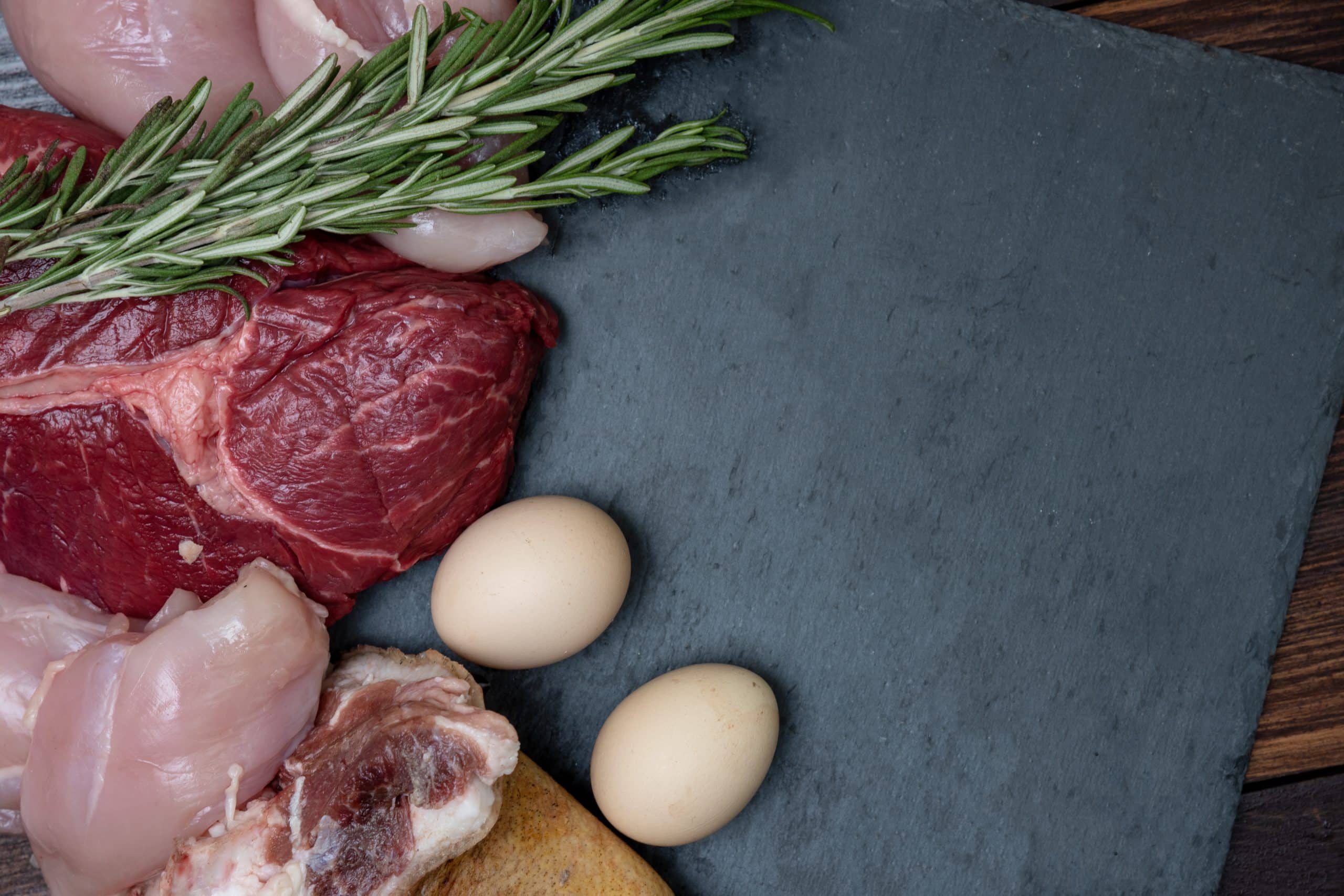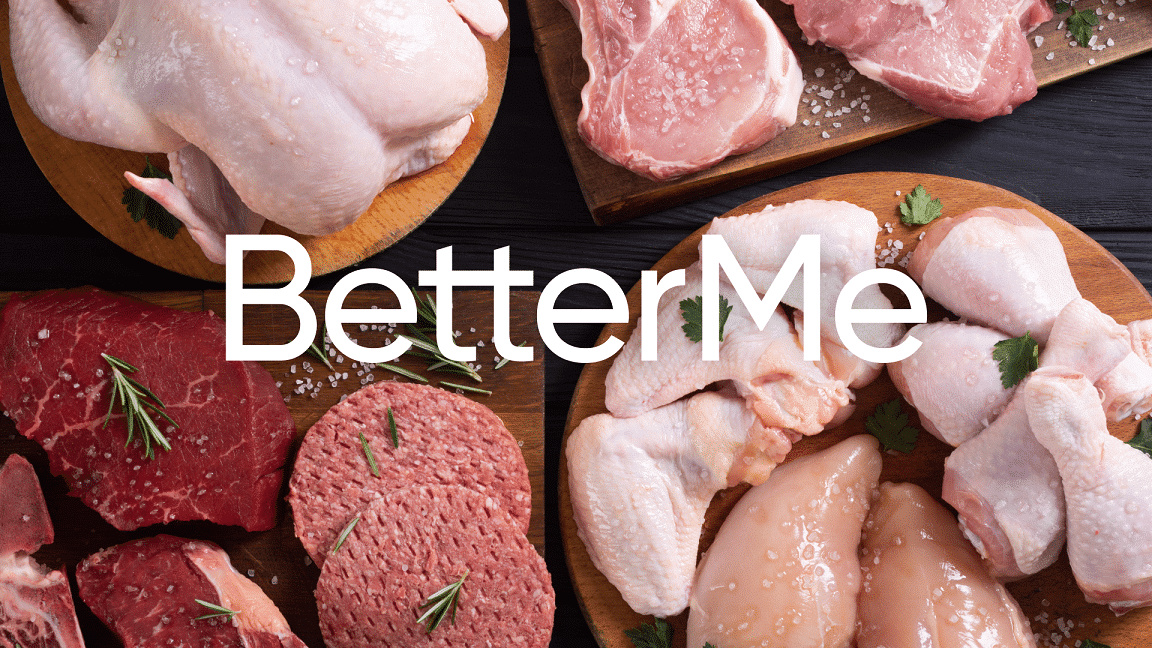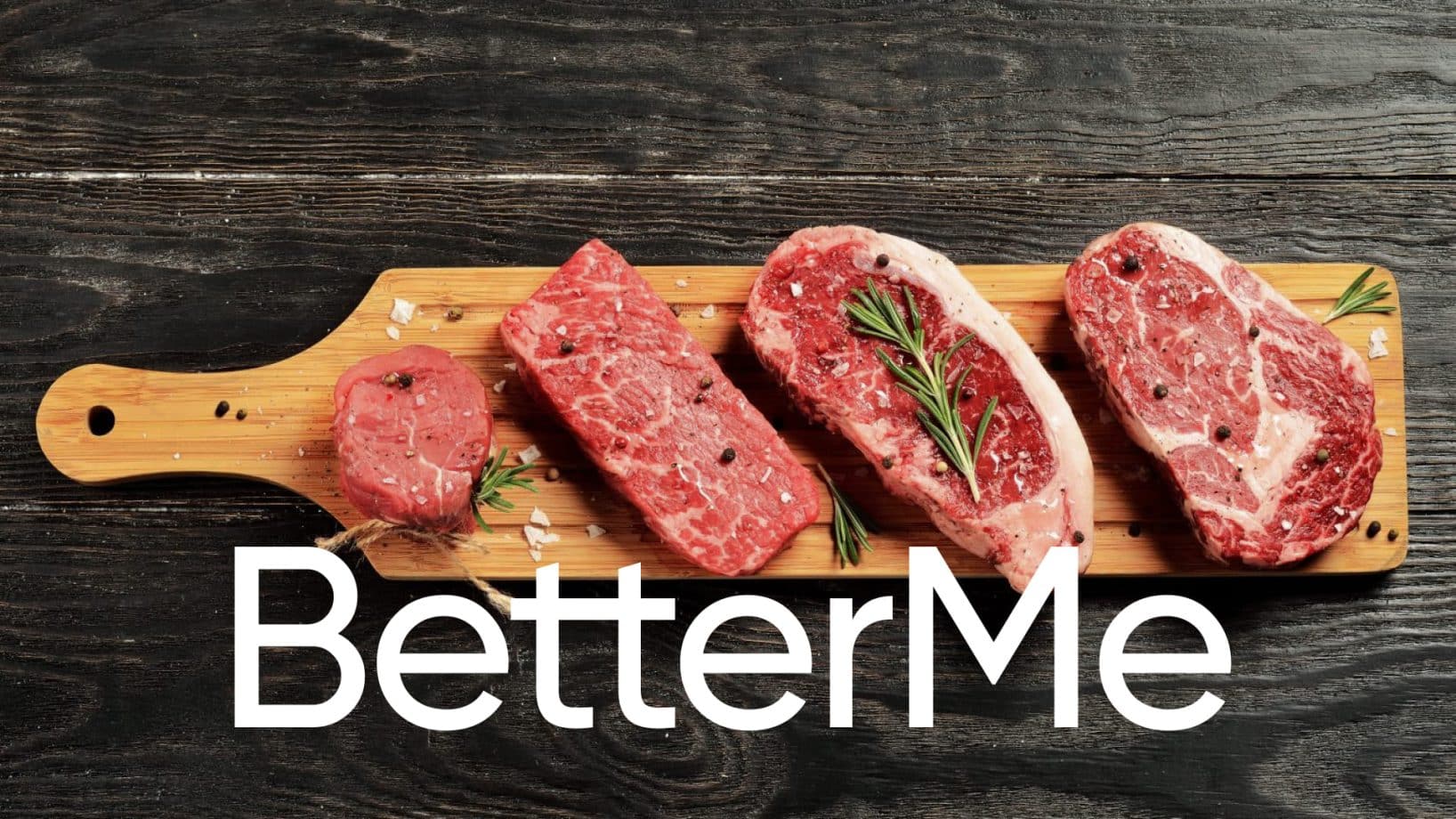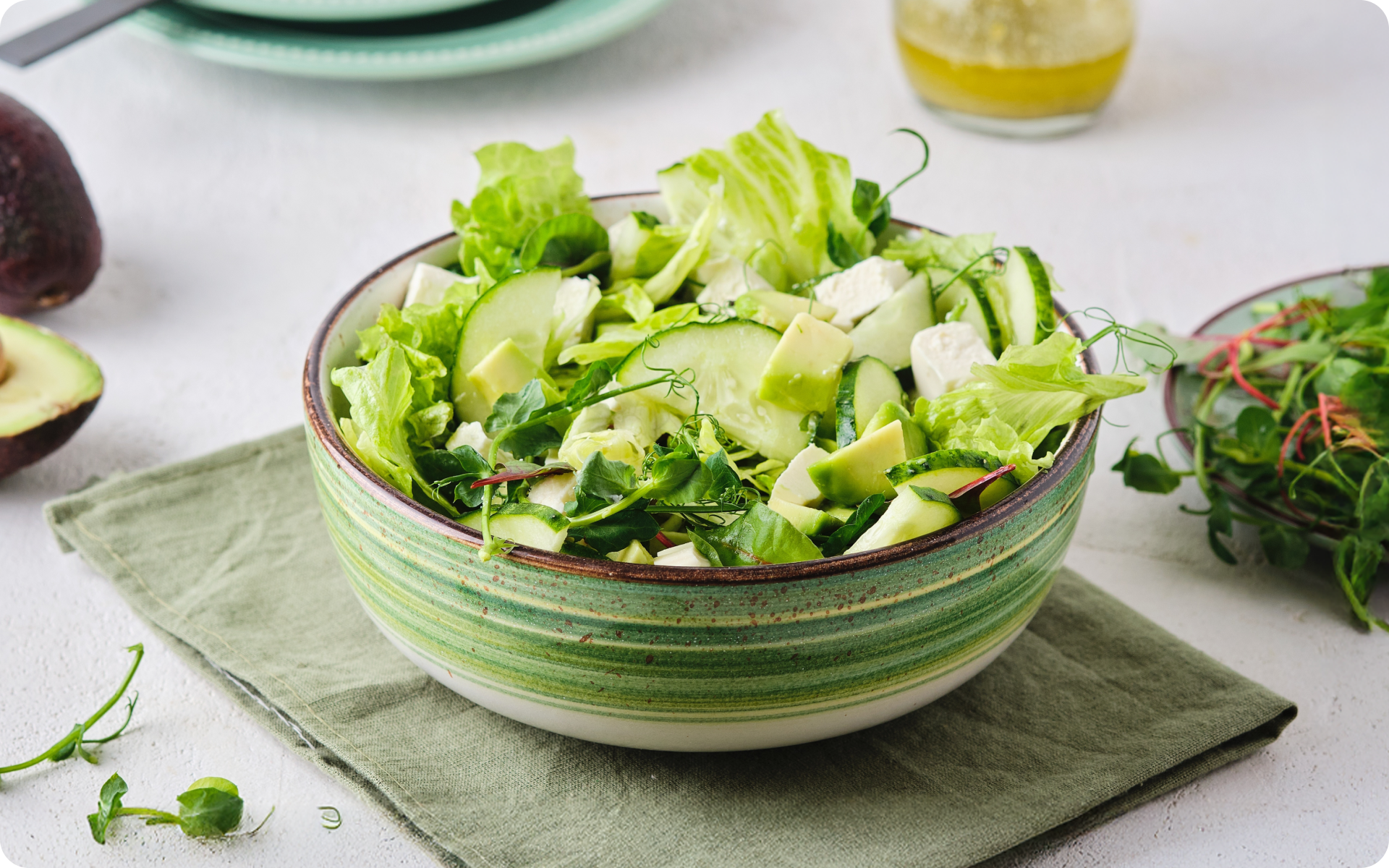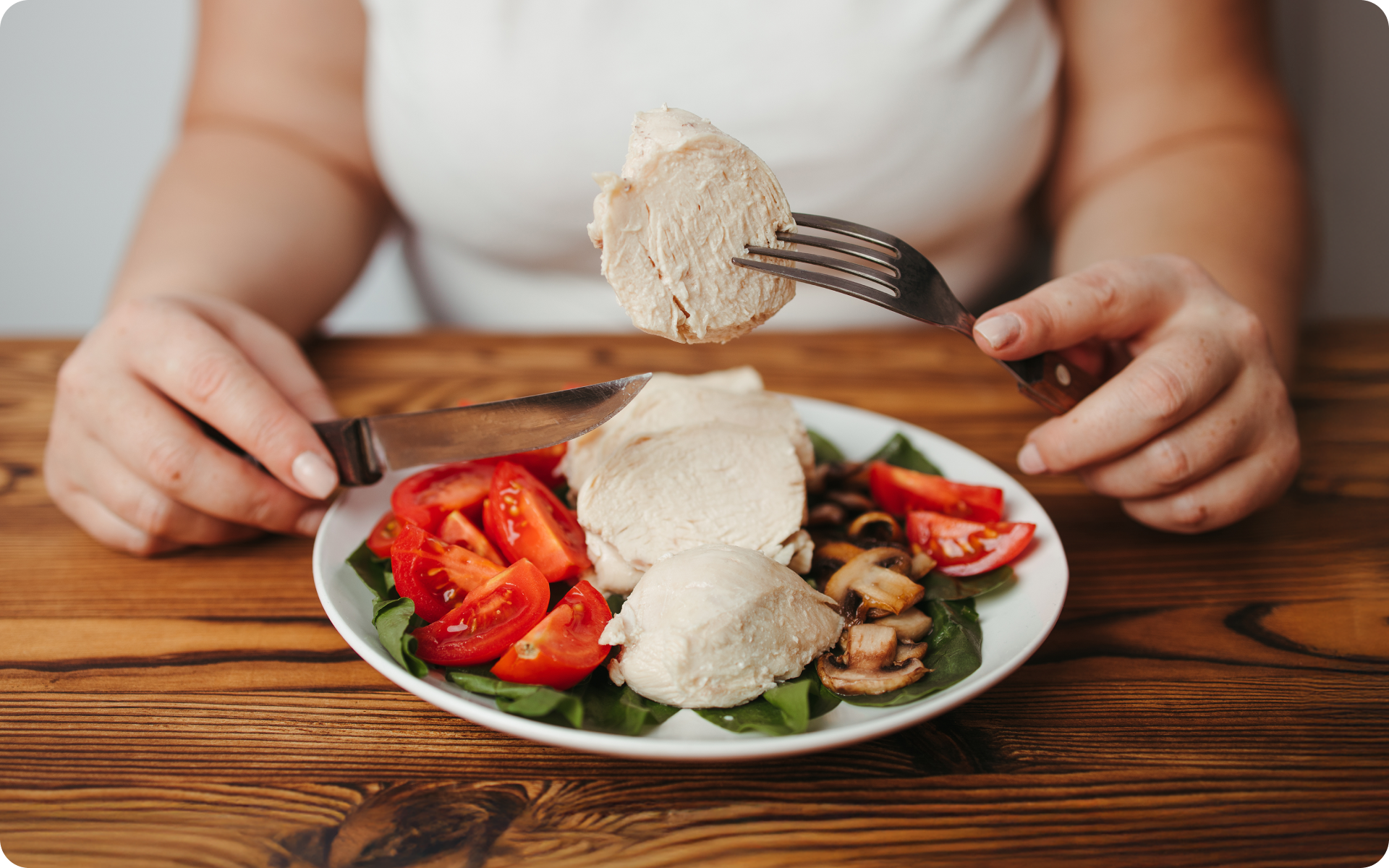The carnivore diet is a radical nutritional plan that entails consuming only animal products. It’s a diet that has gained substantial popularity due to its claimed (but unsubstantiated) benefits – such as weight loss, improved heart health, and enhanced mental clarity.
By eliminating all plant-based foods, the carnivore diet focuses on high-fat, high-protein meals. Another reason for its growing interest is the claims that it could help eliminate food intolerances and allergies. In some cases, people have even self-reported improvement in autoimmune conditions. Importantly, none of these benefits have been scientifically proven, and there are serious health concerns that arise with such a restrictive and unbalanced diet. We strongly recommend speaking to a healthcare provider before trying this or any restrictive diet.
Having a Carnivore Diet meal plan as you start your diet journey can significantly simplify the process, ensuring you get a balanced intake of nutrients, while adhering to the diet’s principles.
Here’s all you need to know about starting a carnivore diet meal plan.
Carnivore Diet Meal Plan
What Do I Eat In a Day On The Carnivore Diet?
As the name suggests, the carnivore diet consists mainly of animal products (2). Beginners on this diet should focus on the following carnivore diet food list:
- Beef – including steak, roast beef, and ground beef
- Chicken – whether it’s roast, grilled, or broiled
- Pork – such as bacon, sausage, and pork chops
- Fish – including trout, salmon, and tuna
- Shellfish – like prawns, lobster, and clams
- Eggs – preferably from free-range chickens
- Lamb – including lamb chops and leg of lamb
- Organ meats – such as liver, kidney, and heart
- Turkey – both white and dark meat
- Duck – roasted or confited.
Dropping pounds by the dozens without putting yourself through the wringer is everyone’s weight loss pipe dream. But what if we told you that the BetterMe app can make that happen? Keep yourself in prime shape with our fat-blasting workouts, delicious budget-sparing recipes, and body-transforming challenges with our app!
You may prefer to choose high-quality animal products for your meal plan. Depending on your values, high-quality could mean:
- Grass-Fed or Pasture-Raised: Animals that are grass-fed or pasture-raised are typically healthier and leaner. They also tend to contain more omega-3 fatty acids which are beneficial for heart health (8).
- Organic: Organic products ensure that the animals have not been given any hormonal treatments or antibiotics, and are fed with organic feed.
- Wild-Caught: For fish and seafood, some people prefer to choose sustainably wild-caught rather than farm-raised.
- Freshness: Fresh meat and seafood have a superior taste and are more nutritious.
- Marbling: Especially for beef, a good amount of marbling indicates a tender and flavorful cut.
- Free-Range Eggs: Chickens that are allowed to roam freely tend to produce eggs that are richer in nutrients.
- No Artificial Additives: High-quality animal products should not contain any artificial additives, colorings, or preservatives.
- Ethically Raised: Animals treated well and raised in an environment that allows natural behaviors is thought to produce better quality meat.
- Lean Cuts: Opt for lean cuts of meat, which have less saturated fat and more protein.
Note – a carnivore diet meal plan should NOT include processed meats such as deli meats, hot dogs, or sausages. These often contain additives and preservatives that go against the principles of the diet.
The whole idea behind the carnivore diet is to eliminate foods that proponents feel are harmful to human health. This includes processed foods, as well as all forms of carbohydrates, including fruits, vegetables, grains, and legumes.
The belief is that our ancestors ate a primarily animal-based diet and thrived on it.
We cover the benefits and risks of an all-meat diet in more detail in a previous post.
What Should I Eat The First Week of The Carnivore Diet?
A carnivore diet meal plan for beginners might look like this for the first week:
Day 1:
- Breakfast: Scrambled eggs with slices of uncured bacon
- Lunch: Roast beef slices
- Dinner: Grilled salmon with a side of bone broth
- Hydration: 8 glasses of water throughout the day
Day 2:
- Breakfast: Ham and eggs
- Lunch: Grilled chicken breast
- Dinner: Pan-seared duck breast, bone broth
- Hydration: 8 glasses of water
Day 3:
- Breakfast: Omelet with cheese
- Lunch: Tuna steaks
- Dinner: Pork chops, bone broth
- Hydration: 8 glasses of water
Day 4:
- Breakfast: Steak and eggs
- Lunch: Turkey slices
- Dinner: Grilled lamb chops, bone broth
- Hydration: 8 glasses of water
Read more: The Banana Diet: Pros, Cons, and Everything Else You Need to Know
Day 5:
- Breakfast: Bacon and eggs
- Lunch: Grilled salmon
- Dinner: Roast beef, bone broth
- Hydration: 8 glasses of water
Day 6:
- Breakfast: Sausage and eggs
- Lunch: Chicken thighs
- Dinner: Steak, bone broth
- Hydration: 8 glasses of water
Day 7:
- Breakfast: Pork belly and eggs
- Lunch: Lobster
- Dinner: Roast lamb, bone broth
- Hydration: 8 glasses of water
The carnivore diet 7-day meal plan above can be adjusted as per your preferences and food availability.
Our cheap meals for weight loss guide further explores how you can save money while on this diet.
How Many Meals a Day On a Carnivore Diet?
There are no strict rules about how many meals you should eat in a day on a carnivore diet.
Many people on the carnivore diet choose to have two meals a day – one in the morning and one in the evening. Depending on the timing, this can be a form of intermittent fasting, where you restrict your eating window to a specific timeframe. For example, you may eat from 8 am to 2 pm, and then fast for the rest of the day until 8 am the next day.
Others prefer to have three meals a day, and some even opt for four smaller meals throughout the day.
A carnivore diet meal plan for weight loss may involve fewer meals, as you restrict your calorie intake to promote fat burning.
Can You Eat Eggs Everyday On a Carnivore Diet?
Yes, you can eat eggs every day on a carnivore diet. Eggs are an excellent source of protein and healthy fats, making them a staple in many meal plans (12). They are also versatile and can be cooked in various ways to add variety to your diet.
That said, there are some concerns about consuming too many eggs, particularly if you have a history of high cholesterol or heart disease. That’s because the egg yolks contain cholesterol, which some believe can raise blood cholesterol levels. However, research has shown that dietary cholesterol does not significantly affect blood cholesterol in most people (4).
For those worried about any carnivore diet side effects, eating whole eggs in moderation (around 1 per day) and choosing egg whites instead of whole eggs may help mitigate any potential negative effects.
Want to build an attention-grabbing bubble butt, blast away fat that’s stored in all the wrong places, spring-clean your diet, turn back the clock on your skin, skyrocket your self-confidence and shatter your insecurities? Check out the BetterMe app and set this plan in motion!
Further, a carnivore diet meal plan may involve other steps to reduce the overall cholesterol intake, such as:
Select Leaner Cuts of Meat
Opt for lean cuts of meat, such as skinless poultry, lean beef, and fish. These usually have less saturated fat and cholesterol compared to fattier cuts.
Cook Healthier
Use cooking methods like grilling, baking, or broiling that don’t require additional fat. Avoid deep-frying or breading your meats which add extra saturated fats.
Trim Visible Fat
Removing visible fat from meat can significantly lower the amount of saturated fat and cholesterol. This includes skin from poultry.
Balance Your Protein Sources
Diversify your protein sources. Fish, in particular, is a good source of lean protein and contains beneficial fats, specifically omega-3 fatty acids, which are heart-healthy (6).
Consume Bone Broth
Bone broth is a rich source of protein and collagen, and it’s typically low in fat. Incorporating it into your diet can help balance your nutrient intake.
Moderation in Butter and Dairy
While dairy products are allowed on a carnivore diet, choose natural, high-quality dairy and use it in moderation due to its saturated fat content.
What Don’ts Are On Carnivore Diet?
The main don’ts on a carnivore diet are:
Don’t Eat Any Plant-based Foods
This includes fruits, vegetables, grains, and legumes. The carnivore diet focuses solely on animal-based foods.
Don’t Consume Any Processed Or Packaged Foods
These types of foods often contain additives, preservatives, and other chemicals that are not encouraged on the diet (10). Stick to whole and unprocessed meats for optimal health.
Don’t Drink Any Sugary Or Alcoholic Beverages
These types of drinks can lead to weight gain and may contribute to inflammation in the body (1) (3). Stick to water, bone broth, black coffee or tea while on a carnivore diet.
Don’t Restrict Yourself From Eating Enough
Many people mistakenly believe that a carnivore diet is all about restricting calories and portion sizes. However, it’s important to listen to your body and eat until you are satisfied.
Don’t Rely Solely On Lean Meats
While lean meats may seem like a healthier option, they often lack the necessary fat content for a carnivore diet. Make sure to include fattier cuts of meat or incorporate other sources of healthy fats, such as eggs or fatty fish.
Don’t Forget To Vary Your Protein Sources
It’s important to consume a variety of animal-based proteins to be sure that you are getting a wider range of nutrients. This can include beef, poultry, seafood, organ meats and more.
Don’t Neglect Hydration
With a diet focused on meat and little to no fiber, constipation can be a concern (9). Make sure to drink enough water.
Don’t Overdo It On The Salt
While a moderate amount of salt is necessary for a healthy diet, consuming too much can lead to high blood pressure and other health issues (5). Instead of reaching for the salt shaker, try incorporating spices and herbs for flavor instead.
Read more: Healthy Thanksgiving Desserts: How To Maintain Your Diet This Festive Season
How To Do The Carnivore Diet on a Budget
High-quality, grass-fed meats can be expensive, making the carnivore diet seem like a luxury. However, with some planning and strategy, it is possible to do the carnivore diet on a budget. Here are some tips to help you save money while following a carnivore diet:
Shop for Sales
Keep an eye out for sales and discounts on meats, especially during holidays or seasonal promotions. Buying in bulk can also help reduce the overall cost.
Choose Cheaper Cuts of Meat
Instead of opting for expensive cuts, consider choosing cheaper cuts that may require longer cooking times. These include cuts like beef chuck, lamb shoulder, and pork butt.
Buy Frozen
Buying frozen meats can often be cheaper than buying fresh. Plus, you can store them for longer periods in a freezer.
Shop at Local Butchers or Farmers Markets
Instead of purchasing meat from big supermarkets, consider buying directly from local butchers or farmers markets. Not only are you supporting local businesses, but you may also find better deals and fresher meats.
Incorporate Organ Meats
Organ meats, such as liver or heart, are usually cheaper than muscle meat cuts and are packed with nutrients. Don’t be afraid to try incorporating them into your meal plan.
Make Your Own Bone Broth
Instead of buying pre-made bone broth, consider making your own using leftover bones and scraps from your meat purchases. This not only saves money but also ensures that you are consuming a high-quality, homemade product.
Get Creative with Eggs
Eggs are a budget-friendly source of protein and can be used in various dishes. Get creative and incorporate them into your meals in different ways to avoid boredom.
FAQs
Can You Eat Eggs Every Day on a Carnivore Diet?
Yes, you can. Eggs are an excellent source of protein and healthy fats, making them a staple in carnivore diet meal plans. However, it’s essential to consume them in moderation, particularly if you have a history of high cholesterol or heart disease.
Research suggests dietary cholesterol in eggs does not significantly affect blood cholesterol levels in most people (7). Therefore, consuming around 1 whole egg per day may be considered safe.
Can You Eat Bacon Every Day on a Carnivore Diet?
While bacon is permitted on the carnivore diet, it should not be the mainstay of your meals due to its high saturated fat and sodium content.
Eating bacon every day could lead to an excessive intake of these components, which might have a detrimental impact on cardiovascular health (11). The key is to balance bacon with leaner cuts of meat and to consume it in moderation. Many types of bacon also contain additives and preservatives which are discouraged on the carnivore diet, so read your labels carefully.
How Soon Do You See Results on Carnivore Diet?
You may start to notice the initial effects within the first few weeks. This is when your body begins to adjust to the change in diet and starts to burn fat for energy instead of carbohydrates. More significant weight loss could potentially be observed after a few months on the diet.
What Do Carnivores Eat for Breakfast?
Carnivores typically start their day with a protein-rich breakfast. Common choices might include eggs (scrambled, boiled, or in an omelet), bacon, sausage, or a piece of steak. Some may also prefer fish or poultry. Remember, the key is variety; rotating between different types of meats ensures a broad spectrum of nutrients.
The Bottom Line
A carnivore diet meal plan claims to offer numerous benefits, including weight loss, however, none of them have been substantiated.. It’s a highly restrictive diet that may not be safe for everyone. If you do want to try it, speak to your healthcare provider first. To get the most out of the diet, it’s essential to consume a variety of high-quality animal-based proteins and fats, stay hydrated, and listen to your body’s hunger cues.
DISCLAIMER:
This article is intended for general informational purposes only and does not serve to address individual circumstances. It is not a substitute for professional advice or help and should not be relied on for making any kind of decision-making. Any action taken as a direct or indirect result of the information in this article is entirely at your own risk and is your sole responsibility.
BetterMe, its content staff, and its medical advisors accept no responsibility for inaccuracies, errors, misstatements, inconsistencies, or omissions and specifically disclaim any liability, loss or risk, personal, professional or otherwise, which may be incurred as a consequence, directly or indirectly, of the use and/or application of any content.
You should always seek the advice of your physician or other qualified health provider with any questions you may have regarding a medical condition or your specific situation. Never disregard professional medical advice or delay seeking it because of BetterMe content. If you suspect or think you may have a medical emergency, call your doctor.
SOURCES
- Alcohol, inflammation, and gut-liver-brain interactions in tissue damage and disease development (2010, ncbi.nlm.nih.gov)
- Carnivore Diet – Evidence, Benefits, Risks, Food Lists (2023, diabetes.co.uk)
- Excessive intake of sugar: An accomplice of inflammation (2022, frontiersin.org)
- Is There a Correlation between Dietary and Blood Cholesterol? Evidence from Epidemiological Data and Clinical Interventions (2022, mdpi.com)
- Is too much salt harmful? Yes (2019, link.springer.com)
- Nutrients in Fish and Possible Associations with Cardiovascular Disease Risk Factors in Metabolic Syndrome (2010, mdpi.com)
- Nutritional Viewpoints on Eggs and Cholesterol (2021, mdpi.com)
- Omega-3 Fatty Acids and Cardiovascular Disease: Are There Benefits? (2016, link.springer.com)
- Potential effects of reduced red meat compared with increased fiber intake on glucose metabolism and liver fat content: a randomized and controlled dietary intervention study (2019, sciencedirect.com)
- Red and Processed Meats and Health Risks: How Strong Is the Evidence? (2020, ncbi.nlm.nih.gov)
- Saturated Fatty Acid Chain Length and Risk of Cardiovascular Disease: A Systematic Review (2022, mdpi.com)
- The Golden Egg: Nutritional Value, Bioactivities, and Emerging Benefits for Human Health (2019, mdpi.com)
